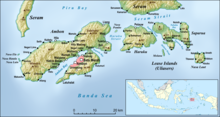Ambon | |
|---|---|
| City of Ambon Kota Ambon | |
governor office of Maluku | |
| Motto: Bersatu Manggurebe Maju | |
 Location within Maluku | |
Location in Maluku and Indonesia | |
| Coordinates: 3°41′48″S 128°10′42″E / 3.69667°S 128.17833°E | |
| Country | |
| Region | Maluku |
| Province | |
| Incorporated | 7 September 1575 |
| Government | |
| • Mayor | Bodewin Wattimena |
| Area | |
| • Total | 359.45 km2 (138.78 sq mi) |
| Elevation | 3 m (10 ft) |
| Population (mid 2023 estimate) | |
| • Total | 354,052 |
| • Density | 980/km2 (2,600/sq mi) |
| [1] | |
| Area code | (+62) 911 |
| Website | ambon.go.id |

Ambon (formerly Dutch: Amboina) is the capital and largest city of the Indonesian province of Maluku. This city is also known as Ambon Manise, which means "beautiful" or "pretty" Ambon in the Ambonese language. It covers a land area of 359.45 km2, and had a population of 331,254 at the 2010 Census[2] and 347,288 at the 2020 Census;[3] the official estimate as at mid 2023 was 354,052.[1] The city is divided into five administrative districts (kecamatan) – namely Nusaniwe, Sirimau, Teluk Ambon (Ambon Bay), Baguala (officially Teluk Ambon Baguala) and Leitimur Selatan (South Leitimur). Known as Indonesia's music city,[4][5][6] Ambon became the first city in Southeast Asia to be recognised as the UNESCO City of Music in 2019.[7]
The city is populated by a mix of ethnic Alifuru (original Moluccans), Javanese, Balinese, Butonese, Bugis, Makassar, Papuan, Minahasa, Minang, Flobamora (Flores, Sumba, Alor and Timor ethnics) and those of foreign descent (Chinese, Arabian-Ambonese, Spanish-Ambonese, German-Ambonese, Portuguese-Ambonese and Dutch-Ambonese). Between 1999 and 2002, there was social unrest motivated by racial intolerance.
- ^ a b Badan Pusat Statistik, Jakarta, 28 February 2024, Kota Ambon Dalam Angka 2024 (Katalog-BPS 1102001.8171)
- ^ Biro Pusat Statistik, Jakarta, 2011.
- ^ Badan Pusat Statistik, Jakarta, 2021.
- ^ "Bekraf canangkan Ambon kota musik dunia". 28 July 2016. Archived from the original on 18 October 2019. Retrieved 18 October 2019.
- ^ "Menuju Kota Musik Dunia, Ketua DPR RI Resmikan Dua Gedung Musik di Ambon | TERASMALUKU.COM | Semua Membacanya". Archived from the original on 18 October 2019. Retrieved 18 October 2019.
- ^ "Lantik DPD PAPPRI, Tantowi Yahya Akui Ambon Kota Musik". 27 May 2013. Archived from the original on 18 October 2019. Retrieved 18 October 2019.
- ^ "UNESCO designates 66 new Creative Cities | Creative Cities Network". Archived from the original on 1 February 2021. Retrieved 31 October 2019.








